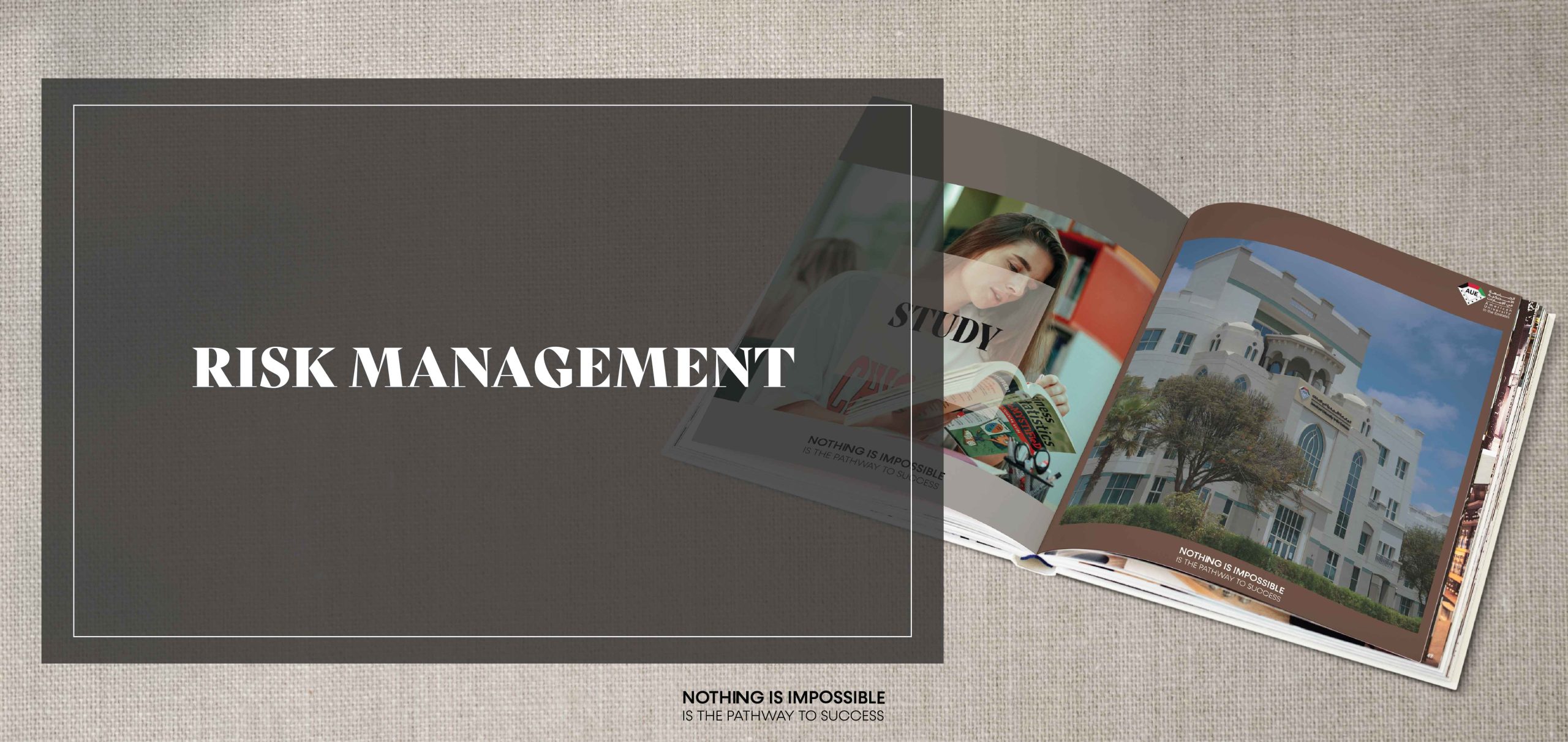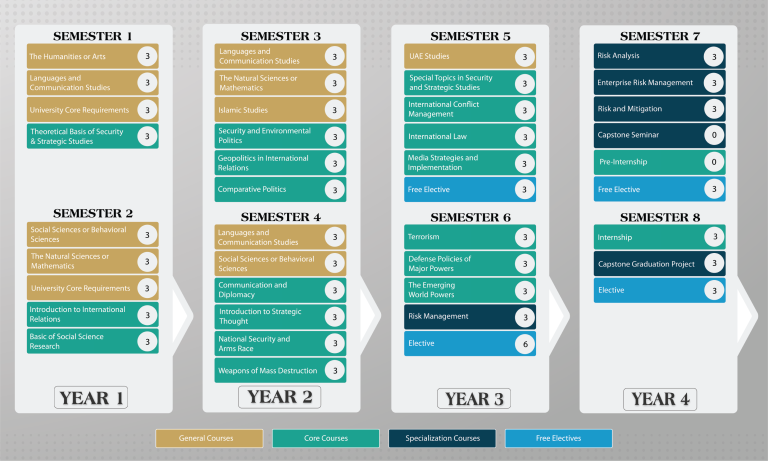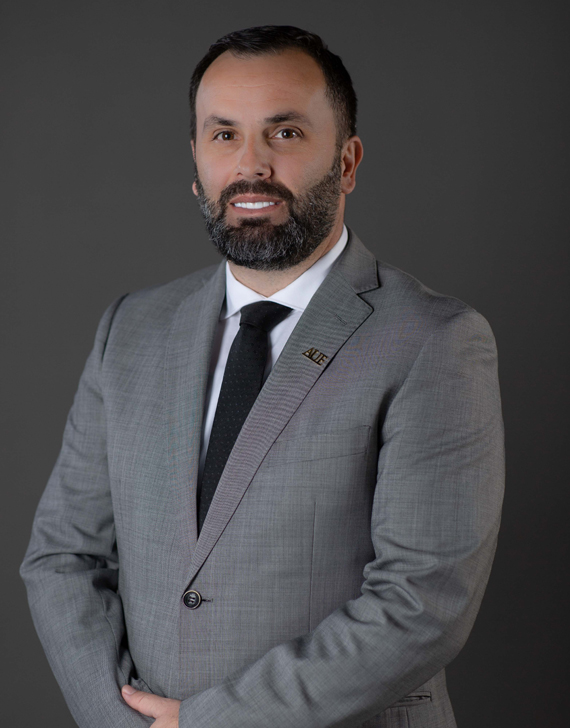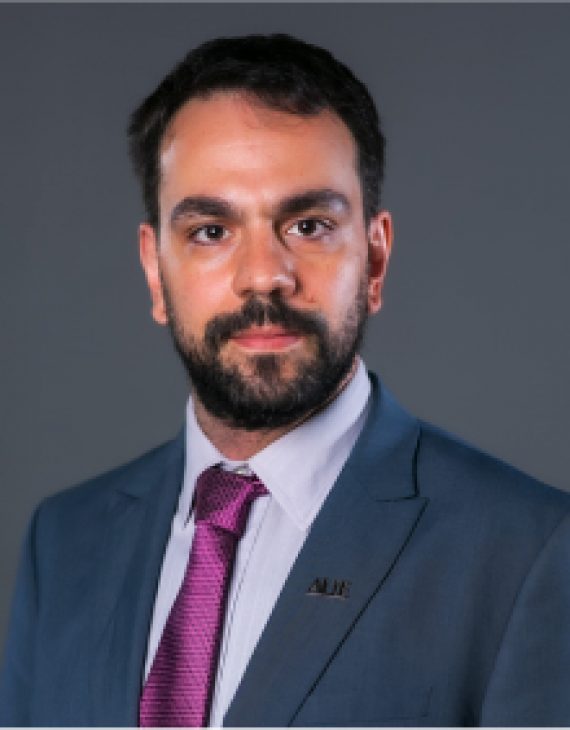
- Overview
- Specialization Structure
- Accreditations
- Faculty
- Admission
-
Duration
4 Years
-
Classes
Weekday Weekend
-
Fees
Tuition (One Semester) ……… Approx. 23,000 AED
One academic year is two semesters
Admission (One Time) ……… 3,000 AED
About Specialization
Embrace the challenge of managing emergencies and ensuring the safety of communities with our Bachelor of Arts in Security & Strategic Studies – Emergency Management program. Dive into the realms of emergency response, incident management, disaster recovery and crisis communication. Develop the skills to coordinate resources, assess risks and lead effective emergency response operations. With this program, you will be prepared for a number of exciting careers in emergency management agencies, public safety organizations or government bodies. Join us and become a beacon of hope and support when communities face the unexpected.
BA in Security and Strategic Studies - Program Goals
- To be a career path program that will graduate experts, decision-makers and leaders in the field of security and strategic studies.
- Motivate students to engage in constant learning inside and outside of the class; learn how to research and propose recommendations in the field of specialization in Security and Strategic Studies.
- Offer quality teaching and research learning resources environment, conducive for undergraduate students.
- Assure quality and consistency in learning outcomes of both theoretical and practical value, meeting the national market demands.
- Continuously develop the program, ensuring operating strategic standards are met, aligning with the AUE’s mission; aligning with national and international standards and strategies and methodologies to produce original and advanced research in the intelligence and security field.
BA in Security and Strategic Studies - Program Learning Outcomes
- Recognize the Concepts, Principles, Implementation of Security Strategic Studies, Intelligence and International affairs.
- Demonstrate critical analysis in the trends of global terrorism.
- Analyze the economic and political impact of international and domestic political conditions.
- Interpret the various elements of the theory of war and state’s behaviors in the affects in conflict situations.
- Contribute to the continued development of academic and professional field in security and strategic studies.
Preparatory Courses
#
1
2
Course Code
CIT 90
ENG 99
Courses
Computer Preparatory
Academic Writing (*)
Credit Hours
0
0
Exemption Condition
Passing the Placement Test
Passing the Placement Test
Program Structure
Course Category
General Education Courses
Core Courses
Specialization Courses
Free Electives
Total
Total Number of Courses
12
19
6
5
42 Courses
Total Number of Credit Hours
36
54
15
15
120 Credit Hours
- General Education Courses
- Core Courses
- Specialization Courses
- Free Electives
A: University Core Requirements
The student selects 6 credit hours (2 courses) from the list below:
B: Languages and Communication Studies
The student must select 9 credit hours (3 courses) from the list below.
Students must take all of the following courses:
Students must take one of the following Arabic Language courses:
C: The Natural sciences or Mathematics
The student must select 6 credit hours (2 courses) from the list below:
D: The Social or Behavioral Sciences
The student must select 3 credit hours (1 course) from the list below:
E: The Humanities or Arts
The student must select 3 credit hours (1 course) from the list below:
F: Islamic Studies
The student must select 3 credit hours (1 course) from the list below
G: UAE Studies
The student must select 3 credit hours (1 course) from the list below.
This course will help the students develop and understand various schools of thoughts of strategic studies. Furthermore, it will bridge the gap between theory and practice of strategic studies through the study of different works by classical and contemporary experts of this field. The course will help the students understand various themes of strategic studies to develop strategic thinking. Students in this course will learn how to create a balance between mindboggling theories and their applications.
The link between International security and environmental politics is centuries old. Increased pace and frequency of conquests and annexations, supported by mechanized and well developed equipment’s (an outcome of industrial revolution), were responsible for making the relation more explicit. This basic fact apart, throughout human history, we see a trend of ignorance towards environmental issues as greater importance always remained associated with apparatus and procedures which were considered a pre-requisite for ensuring security. These problems finally caught human attention and focus in the mid twentieth century. Since then a vast discourse has emerged to solve environmental problems by attempting to reduce the conflict between environment and International security endeavors. The main objective of designing this course is to make students familiar with this intricate web existing between security and environment. The particular discourse introduced in this subject is based primarily on liberal and feminist approaches towards International Relations as well as International Security; the approach similar to that held by Peace studies.
This course intends to examine how mass media (especially at the Age of the Internet) affects political system, social stability, crisis, or ongoing wars. Concepts about fake news, brainwashing and propaganda wars will be examined through various cases studies.
Choose 15 credit hours from any other college/specialization with the condition that all the prerequisites of the chosen courses are met.
Recommended Study Plan

Accreditations
The American University in the Emirates is licensed by the UAE Ministry of Education – Commission for Academic Accreditation | caa.ae

Prof. Chahine A. Ghais
Professor / Dean

Prof. Dusko Tomic
Professor / Program Director - Security And Strategic Studies

Dr. Eldar Šaljić
Associate Professor / Program Director - Security Studies And Information Analysis

Dr. Nahla Hamdan
Assistant Professor / Program Director - Master of Arts and Diplomacy
- For Admission Requirements for Freshman students (those who have just completed high school and have never attended an Institute of Higher Education before) click here
- For Admission Requirements for Transfer students (those who have studied at another higher education institution and would like to transfer their credits to AUE) click here
- For Admission Requirements for Visiting students (those who are currently enrolled in a different higher education institution and would like to take some courses at AUE as part of the study plan of their home university/college) click here
Joining the Program
- Fall Semester
-
September
-
Spring Semester
- January
- Summer Semester
- May




